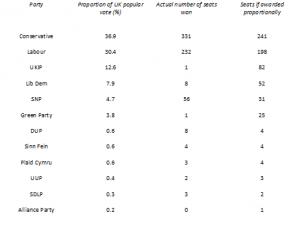One thing that strikes me about the results of the UK election is the arbitary relationship between the number of seats won by each party, and their proportion of the popular vote. The Scottish National Party is now the 3rd largest party in the UK parliament, with 56 seats, but it did this on the basis of 1.5 million votes, while the Lib Dems, with 2.4 million votes, only got 8 seats. Even more bizarrely, the largest Northern Ireland party, the DUP, also won 8 seats, but did so with only 184,000 votes (the same number of seats as the Lib Dems, but less than a tenth of their votes). Meanwhile the Green Party, with eight times as many votes as the DUP, came out of the process with only one seat.
Suffering a brief attack of geekery, I’ve just done the sums (see table below). If seats were awarded proportionally, the Greens would have won 25 seats, the SNP 31, and the Lib Dems 52. The most spectacular difference, though, would have been that UKIP, with 12.6% of the popular vote, would have won 82 parliamentary seats, as opposed to the single seat which it actually won*.
I can’t say that I’m personally sorry that this particular outfit has not got those 82 seats. But, all the same, I can’t help thinking that the lack of relationship between votes cast and MPs elected is one of the causes of cynicism about the democratic process.
What we have at the moment is a system which rewards parties that have concentrated powerbases in particular geographical areas (like the DUP and the SNP, but also Labour and Conservatives, with their heartlands respectively in the big industrial cities and the leafy suburbs and shires). But it punishes parties whose support is more widely and thinly distributed across the country, and so grossly misrepresents the relative strength of opinion in the country in general, to the point where whole swathes of electors are rendered virtually invisible.
The fact that the SNP won all but three seats in Scotland, for instance, gives the impression that the whole of Scotland is fervently nationalist, though in fact the SNP only won half the Scottish votes, leaving the unionist half of Scotland almost completely unrepresented. (And who would have thought, from the coverage of the result that the disgraced and humiliated Lib Dems actually won 900,000 more UK votes than the proud and triumphant SNP?)
A proportional system would still, just, have yielded a right-of-centre majority, based on the popular vote in this election, with Conservatives, UKIP, DUP and UUP between them winning 329 seats, but it would have been a smaller and much more precarious majority than the one the Conservatives won on their own under the first-past-the-post system. There are lots of downsides of PR, but surely the benefit would be that there would be less triumphalism, fewer spurious claims to have the backing of “the people”, and a more transparent process of negotation between parties that represent the enormous diversity of views that actually exist?
 *Of course, these figures assume that everyone would still vote for the same party under a PR system. In fact, supporters of smaller parties often decide to vote tactically for parties they think likely to win. My guess is that under a PR system, the Green Party would actually have won quite a lot more than 25 seats, because a lot of potential Green voters voted Labour this time round. No doubt this would be true of UKIP sympathisers too, many of whom probably voted Conservative for similar reasons.
*Of course, these figures assume that everyone would still vote for the same party under a PR system. In fact, supporters of smaller parties often decide to vote tactically for parties they think likely to win. My guess is that under a PR system, the Green Party would actually have won quite a lot more than 25 seats, because a lot of potential Green voters voted Labour this time round. No doubt this would be true of UKIP sympathisers too, many of whom probably voted Conservative for similar reasons.
It’s perhaps worth remembering that the only party to manage that majority-share across its seats *is* the SNP… and perhaps more to the point that while the Lib Dems got nearly a million more votes, they were campaigning for more than ten times as many seats – their votes-per-seats-campaigned-in is, after all, *far* lower than the SNP, which got almost exactly half the votes it campaigned for. When your electorate is larger, getting more votes isn’t an achievement; when it’s that much larger, getting that small number more votes is actually a rebuke.